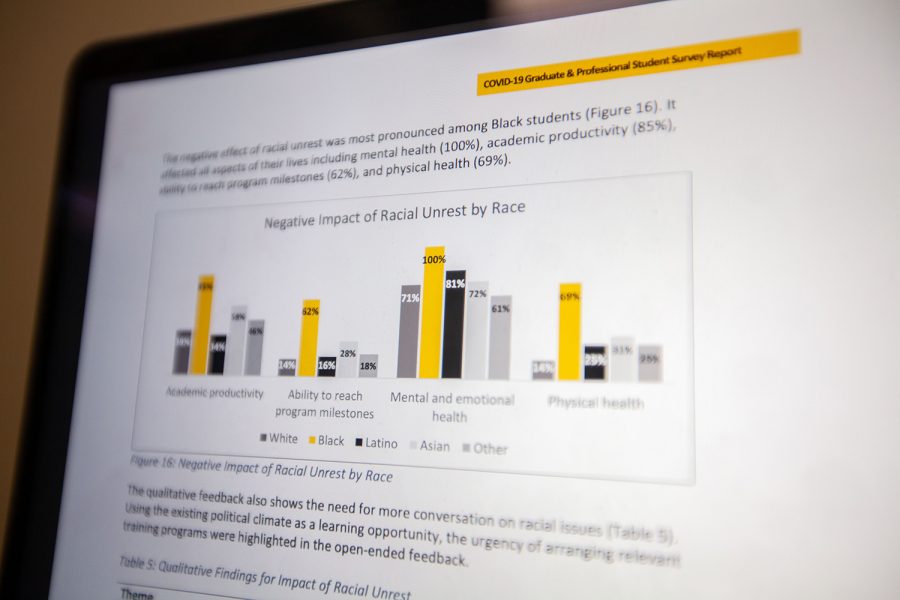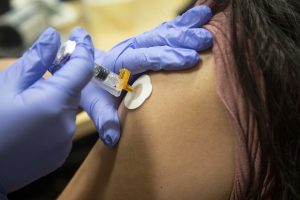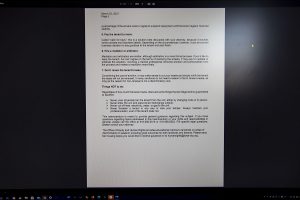Most graduate students report negative mental health according to survey
A recent report by graduate and professional student leaders at the University of Iowa shows several mental health concerns among students alongside gender and racial disparities during the pandemic.
Professional Student Survey Report from the Health and Safety Committee of the University of Iowa Graduate and Professional Student Government (GPSG) as seen on April 1. The report details the well-being of students during COVID-19.
April 1, 2021
Following a tumultuous year for students pursuing secondary degrees, the University of Iowa Graduate and Professional Student Government conducted a survey to understand students’ experiences during the pandemic, with 90 percent of students reporting a decrease in their mental wellbeing.
The GPSG Health and Safety Committee conducted its survey from Nov. 10-17 in the fall 2020 semester and 838 graduate and professional students responded. The report found gender and racial differences in health status, basic needs, stressors, and the impact of the pandemic alongside various concerns about mental health and finances.
The survey found that nonbinary students were less likely to report positive physical and mental health. A high percentage of international students reported that they were concerned about immigration regulations, their ability to travel home, and the health of their family members.
The report found that mental health was a major concern for graduate and professional students in terms of COVID-19 and racial unrest. About 70 percent of students indicated a need for more mental health services.
The report’s Data Team Lead Divya Bhagianadh, who is also a public health Ph.D. candidate, said she was surprised by the magnitude of mental health concerns she saw in the report.
“We knew the mental health of students was a problem, but I didn’t expect 90 percent of students to respond that COVID-19 had negatively affected their mental and social health,” she said. “This survey highlighted the degree of the problems COVID-19 caused and reminded us that students have concerns that need to be addressed.”
Redwan Bin Abdul Baten, the chair of GPSG’s Health and Safety Committee, said he advocated for this survey as he saw a need to focus on graduate and professional students in a way that hasn’t been done since the start of the pandemic.
“Everyone is struggling in isolation and social norms are changing right now,” he said. “So, we wanted to prioritize understanding the mental and physical health of graduate students. Our fellow students have been teaching and research assistants and… they aren’t being asked about their health.”
Bin Abdul Baten said he was motivated to create the report after witnessing his peers’ struggles and the way the pandemic impacted his colleagues differently.
Vice President of GPSG Ellen Kiser said the goal of this report was to develop a better understanding of how the pandemic has affected graduate and professional students.
“We didn’t have a great idea of how graduate students were impacted by the pandemic and we wanted to understand the effects more,” she said. “…Graduate and professional students have had several unique experiences including teaching, doing research, and being students during the pandemic. Those experiences deserve to be heard.”
It was important to GPSG leaders to survey students soon after the protests and call for social justice this summer alongside the pandemic to get the most accurate results, Kiser said.
Bhagianadh said it’s also time for the university community and academia in general to better understand that graduate and professional students are not a homogeneous group.
“The report shows us that while there is an overall impact among students, there are differences based on factors like their gender, race, or citizenship status,” Bhagianadh said. “We have to remember that students have varied needs and have different support systems, and all of these should be considered while trying to address their concerns.”
Fifty-five percent of students reported that they were worried about paying their bills. When looking toward students’ classes, teaching, and research, 92 percent said they were stressed because of their workload and 78 percent said COVID-19 negatively affected their academic productivity.
Now that the report is finished, Kiser said GPSG intends to use its space in shared governance to amplify the voices of graduate students by sharing the report.
“Now that we have data, it’s important to share it with various levels of the University of Iowa, from [the] students [GPSG represents] to different levels of the administration,” she said. “We need to understand and better the experience of graduate and professional students.”
The survey results show that while the majority of graduate and professional students said they agreed the UI communicated COVID-19 updates, less than half said the university supported students and adapted to changes that were made during the pandemic. Only a third of student respondents said they felt safe on campus.
When looking at the report, Bin Abdul Baten said it’s important to remember that this data represents hundreds of people’s experiences over the last year.
He said it’s time to make this and other data points a part of the policy decisions the university is making regarding graduate and professional students.
“The survey allowed us to look really deeply into the lives of students and know the actual experience[s] people are going through,” he said. “Our survey also focused on asking questions that will inform policymakers and administrators so they can make better decisions when it comes to COVID-19.”







